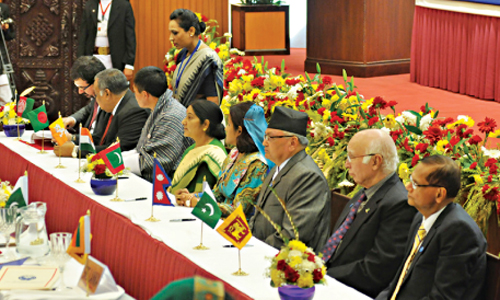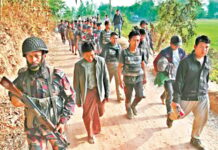SAARC leaders renew commitment to connectivity, fight terrorism
The 18th summit of the South Asian Association for Regional Cooperation summit concluded on Thursday by adopting the ‘Kathmandu Declaration 2014’ renewing the commitment of the member states to boost regional connectivity, combat terrorism, reduce impacts of climate change and alleviate poverty in South Asia. The eight SAARC countries signed the ‘SAARC Framework Agreement for Energy Cooperation (Electricity)’ to create a regional energy market and enhance the cross-border electricity trade and adoption of a 36-point ‘Kathmandu Declaration.’ At the concluding session, the SAARC leaders also agreed that the communications ministers would sit again within next three months to discuss two other agreements – Motor Vehicle Agreement for the Regulation of Passenger and Cargo Vehicular Traffic, SAARC Regional Agreement on Railways. Nepal’s prime minister and current SAARC chairperson Sushil Koirala termed the 18th summit successful. In his concluding address, Koirala said commitment and shared responsibility to establish stability and prosperity in South Asia was needed to bring tangible progress in the region through cooperation and partnership. ‘Better connectivity is lifeline of any region to promote trade and people-to-people contact,’ he said. The Kathmandu Declaration said the SAARC leaders recognized that after nearly thirty years of the SAARC, it is time to reinvigorate the regional cooperation and revitalize it as an effective vehicle to fulfill the developmental aspiration of the people in South Asia. The SAARC leaders also determined to deepen regional integration for peace and prosperity by promoting mutual trust, amity, understanding, cooperation and partnership. The Kathmandu Declaration touched upon Regional Cooperation, South Asian Economic Union, SAFTA and Trade Facilitation, SAARC Development Fund, Connectivity, Energy, Poverty Alleviation, Post-2015 Development Goals, Agriculture and Food Security, Environment and Blue Economy. The Declaration also mentioned cooperation in the fields of Health, Education, Youth, Women and Children, Social Protection, Migration, Science and Technology, Telecommunication, Tourism, Culture, Media, Combating Terrorism and trans-national Crimes, Governance, Strengthening SAARC processes, SAARC Observers and Nineteenth Summit. As for the regional cooperation, the SAARC leaders empahised on cooperation in trade, investment, finance, energy, security, infrastructure, connectivity and culture and implementing projects, programmes and activities in a prioritized, result-oriented and time-bound manner. The leaders unequivocally condemned terrorism and violent extremism in all its forms and manifestations, and underlined the need for effective cooperation among the member states to combat them. They also agreed to collaborate and cooperate on safe, orderly and responsible management of labour migration from South Asia to ensure safety, security, and wellbeing of their migrant workers in the destination countries outside of the region. They recognised the manifold contributions of ocean-based Blue Economy in the SAARC region and the need for collaboration and partnership in this area. They reiterated their strong commitment to free South Asia from poverty and directed the ministerial and secretary-level mechanisms on poverty alleviation to review the progress. The leaders agreed to increase investment, promote research and development in the agriculture sector for enhancing productivity to ensure food and nutritional security. They agreed to hold henceforth the meetings of the SAARC Summit every two years or earlier, if necessary, the council of ministers once a year, the standing committee at least once a year, the programming committee at least twice a year. The prime minister’s media adviser, Iqbal Sobhan Chowdhury, in a press briefing said the SAARC leaders valued the proposals of prime minister Sheikh Hasina and most of her proposals including ‘Blue Economy’ and ‘Regional Connectivity’ were included in the Kathmandu Declaration. The SAARC chairman declared that the next 19th Summit would be held in Islamabad, Pakistan in 2016. Pakistan earlier in 1998 hosted the 4th SAARC Summit and in 2004 hosted the 12th Summit. At the closing ceremony, Narendra Modi and Nawaz Sharif shook hands with a smiling face. The heads of governments of two historically rival countries posed for a photo session while shaking hands for nearly a minute and they were seen talking to each other. Earlier in the morning, Modi and Nawaz had exchanged pleasantries at the retreat at Dhulikel. Spouses of head of states and of governments, delegates from SAARC member states, foreign ministers and their spouses, the foreign secretaries and their spouses, secretary general and his spouses, representatives of observer delegations and were present at the closing ceremony.
Source: New Age










